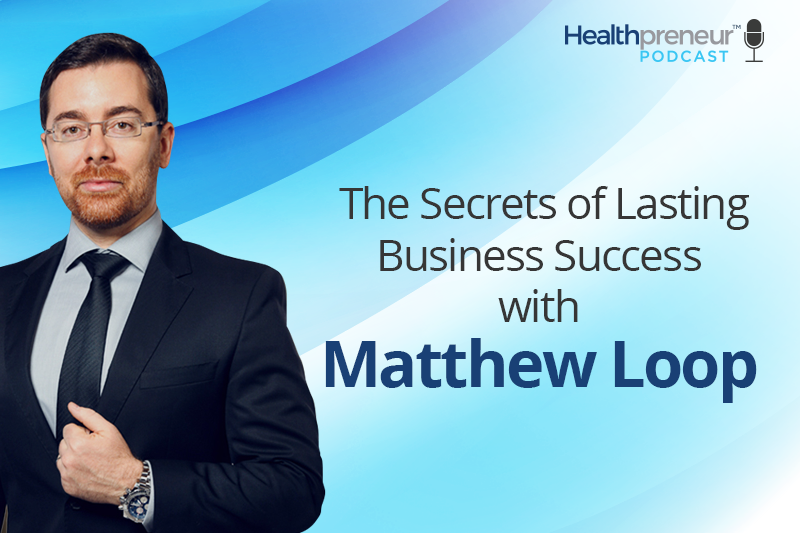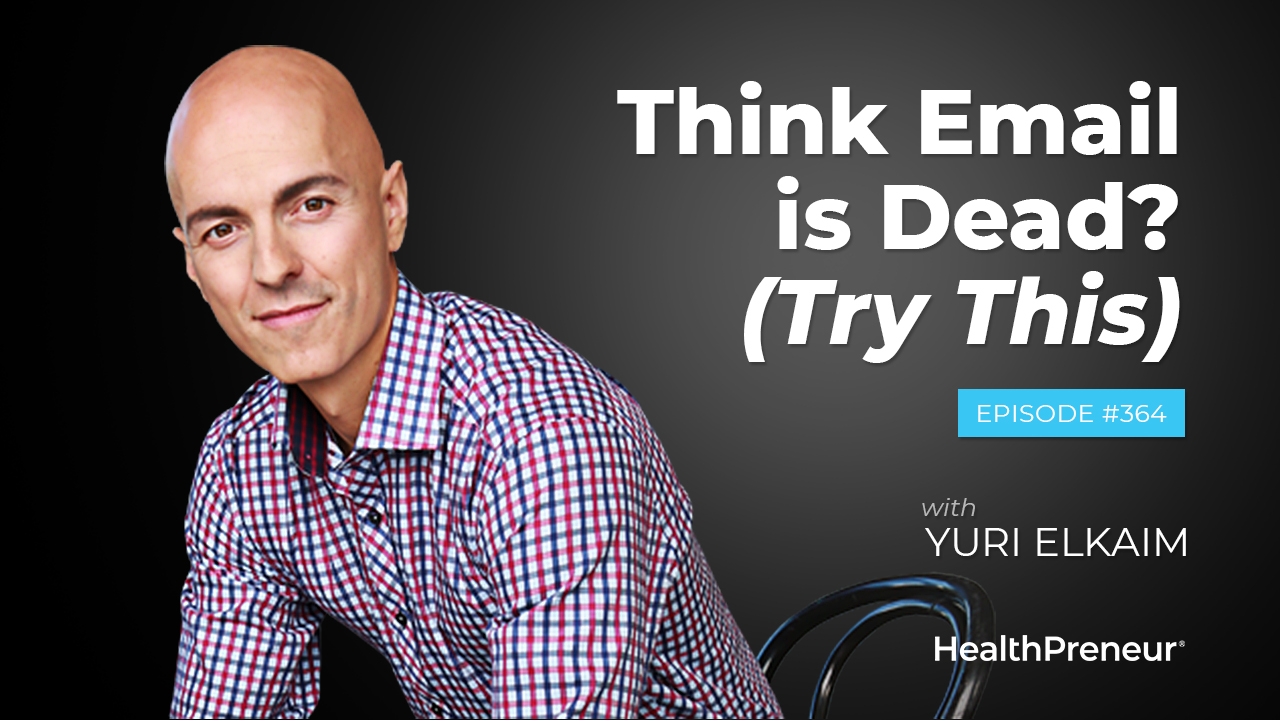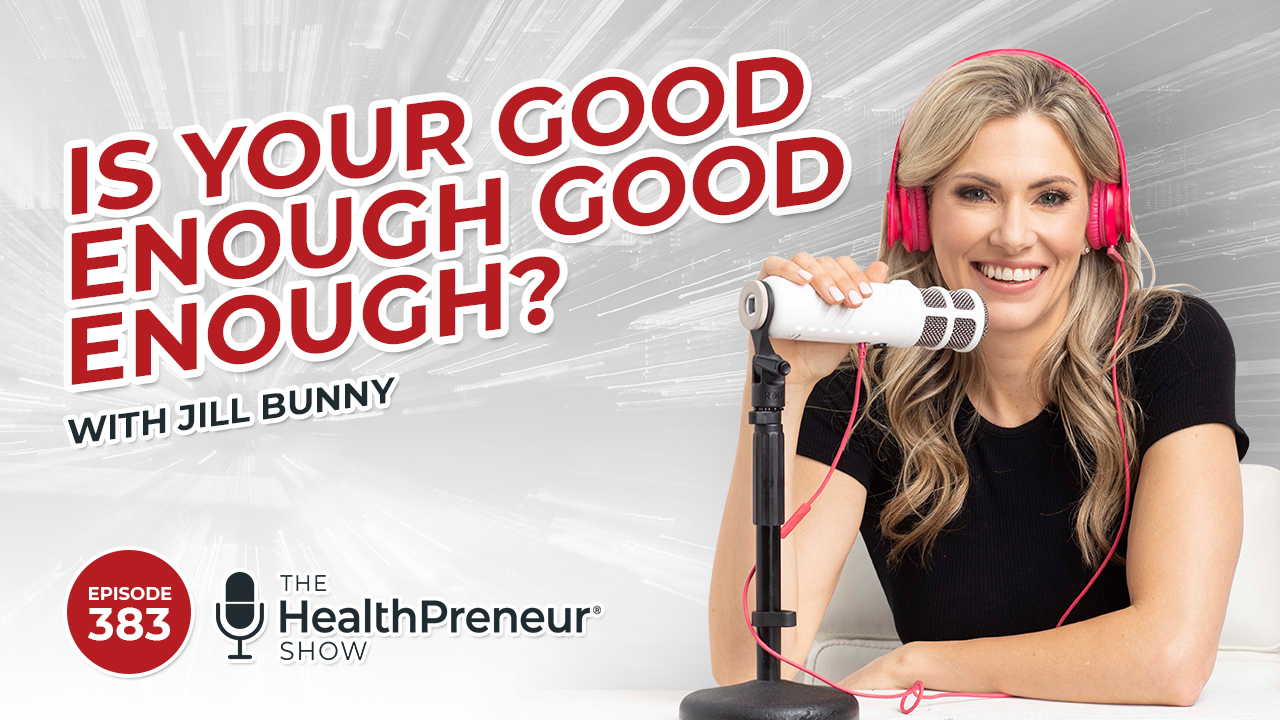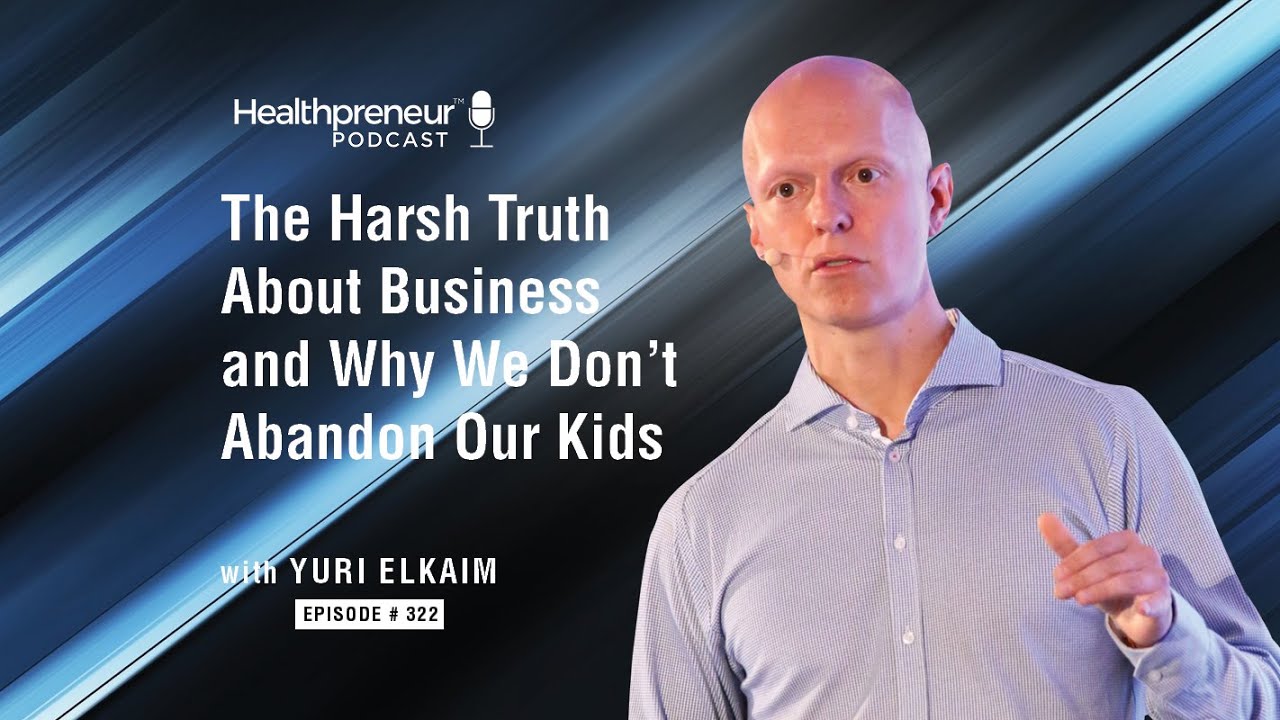How LIFEAID Rolled Into the Competitive Beverage Industry with Massive Success with Aaron Hinde
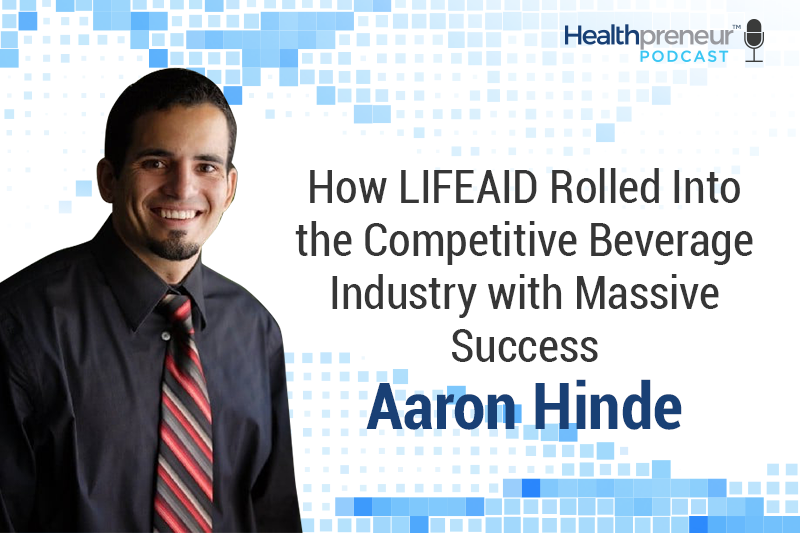
Today we’re on the 74th episode of the Healthprenuer Podcast. I am chatting with Aaron Hinde, sports chiropractor turned President and Co-Founder of LIFEAID, the beverage company that is the official sponsor of the CrossFit Games. I met Aaron five or six years ago, and man, how his company has scaled and succeeded since then!
Aaron was inspired to start LIFEAID when he realized that all the energy drinks out there – while cool, sexy, hip, and perfectly-branded – are filled with junk and just plain bad for you. Makes sense, right? What’s cool is that, to this day, Aaron and his company haven’t budged on their commitment to clean, functional products. This integrity hasn’t gone unnoticed, and the numbers prove it.
Through this growth, Aaron has learned some key lessons in hiring, “going big” (or not), cash flow, and ROI. He’s even made some game-changing realizations about himself as an entrepreneur and the people he brings on the team. This episode is for any entrepreneur looking to scale their business while maintaining the integrity and quality of their offering. Tune in for priceless nougats of business wisdom topped off with a morning routine that has Aaron prepped for more great things to come!
In this episode Aaron and I discuss:
- The inspiration for LIFEAID and how they became the CrossFit Games official sponsor
- Standing for quality and functionality from the very beginning
- The challenges and successes when rapidly growing the company
- How his role and hiring process has evolved over time
- “Going big,” taking on investors, and cash flow for stockholders
- The start-up struggle to stay focused on ROI
1:00 – 5:00 – Aaron, his company, and his beginnings
5:00 – 8:30 – The mindset during product development: Cool, sexy, hip, functional, and clean
8:30 – 11:00 – Cash flow, mentorship, and looking to information marketers to sell online
11:00 – 14:30 – Success through a B2B offer, seeing the customer’s perspective, and teamwork
14:30 – 20:00 – Growth changing Aaron’s role, their hiring process, and patience
20:00 – 22:00 – Focusing on cash flow, taking on investors, and holding off on “going big”
22:00 – 23:00 – Losing focus on ROI-based decisions: Nightclub party fail
23:00 – The Rapid Five
Transcription
Welcome to today’s show. Today we are speaking with Aaron Hinde, the President and Co-founder of LIFEAID beverage company. I met Aaron five or six years ago at a Genius Network event and we hit it off.
At the time, he was ramping up his healthy sports drink business. It’s was cool to hear about what he was doing back in the day. Fast forward five or six years, and it’s amazing to see the progress, success, and scale they’ve achieved.
I’m excited to have him on the show today because he’s got a different business than a lot of us. He has a physical beverage that has propelled into a very competitive marketplace. LIFEAID has become one of the official if not the official drinks of the CrossFit Games. They’ve also sponsored a lot of other cool events in the health and fitness space.
LIFEAID has been on the Inc 500 fastest growing companies list for the past two years in a row. They now have 55 full-time and 50 part-time members on their team.
Aaron’s driving to the airport as we’re having this talk. He’ll share some cool lessons from his experience running a physical product business where there’s often inventory and cash flow issues. Then he’ll discuss entering a very competitive marketplace. Whether you’re in that same space, which most of us aren’t, there are insights and lessons that you can apply into your business.
Without any further ado, let’s welcome Aaron onto the show and let’s get into it.
***********************************************************
***********************************************************
Aaron Hinde, welcome to the Healthpreneur podcast. How’s it going, buddy?
Aaron: It’s going great, Yuri. Good to be here.
Yuri: You are joining me live from the car as you are driving to the airport, about to miss your flight, so I appreciate you taking the time and prioritizing this over your plane ride.
Aaron: Ha! Great to be on.
Yuri: Awesome, man. You said you just had a meeting with Walmart! For our listeners who don’t know what you do, can you tell us about your company and how you serve your peeps?
Aaron, his company, and his beginnings
Aaron: Our company is LIFEAID beverage company. I am the President and Co-founder. We make very clean, nutritional products for active lifestyles. A lot of people know us by our FitAID beverage, which is a clean recovery drink that is big in CrossFit and functional fitness.
We’re the official recovery drink in the CrossFit Games, the official recovery drink of the Spartan Race, and sold in about 10,000 accounts. We are sold in a lot of gyms nationwide and internationally as well.
Yuri: How did you become the official beverage of the CrossFit Games and Spartan Race?
Aaron: It started at the beginning of the journey. My business partner Ryan and I met in a CrossFit gym in Santa Cruz. I was a sports chiropractor, so I used to work on people from CrossFit headquarters and athletes that came into town. I was always more involved as a trainer and worked out in the traditional Globo Gym environment.
They got me to come over and give CrossFit a try. That’s where we met and started this LIFEAID journey. Fast forward six years, and we’re now the official sponsor of the CrossFit Games.
Yuri: Wicked. What was your mindset during the development of the brand and the different products? Were you thinking how you would separate yourselves from Gatorade or Powerade? What did that process look like?
The mindset during product development: Cool, sexy, hip, functional, and clean
Aaron: Back in 2010, part of the “A-HA!” moment was when I went down the grocery aisle with my young son, they had an open-air beverage cooler, and his little hands reached for one of the popular energy drinks. My profession was to try and get people off those, so I was offended by that.
But I realized that energy drinks had done two very effective things. One, they’re very cool, sexy, and hip, so they’ve done a great job on the lifestyle branding. Number two, they’re functional. They do work. What they’re missing is they’re not healthy. If you poll 100 energy drink drinkers, nobody is going to tell you they’re drinking it for health reasons, right?
We knew there had to be a better way. We’re here in Santa Cruz, California, which is kind of the hippie capital of the world. The clean health drinks, like kombucha and chia drinks and so forth, are more of an acquired taste. They’re not cool, sexy, and hip like the energy drinks.
We wanted to create something that had cool factor, functionality behind it, but also something we could give a “wink wink” to the moms out there because it’s clean and doesn’t have a bunch of added caffeine, sodium, artificial ingredients, and so on.
Yuri: That’s awesome. Going into business online and becoming an expert or creating books and information is one thing, creating a supplement/beverage company is a very different thing. Was that a daunting task? What were some of the obstacles when you guys started?
Cash flow, mentorship, and looking to information marketers to sell online
Aaron: There have been many, many obstacles the entire way. Even just trying to put this thing together. How do you make a beverage? How do you make it taste good?
The first obstacle was when we pulled some money together, added some initial concepts, and put together some initial supplement blends that we wanted in the drinks. We went down to the flavor house and handed over the Word document to the flavor scientists. We said, “Here are the supplements and doses we want to put in the drink.”
She immediately looked at it and said, “This looks like a great formula, but there’s no way you’re going to put this in a drink and make it taste good. We’re going to have to cut all the supplements in half. I recommend using sucralose, which is an artificial sweetener.”
We immediately said, “Thanks but no thanks. We’re obviously not in the right place.” We turned around to leave and she said, “Wait, wait, wait. We’ll make a go at it.” We worked at it and worked at it until we were finally able to create great tasting products without sacrificing the efficacy of the blends or the flavor profile.
Yuri: Awesome. What are some of the other challenges? In our business, for instance, we have information plus consumables and supplements. The inventory and cash flow issues on the supplements side is a very different animal from the digitally-based side of things. Is that something you had to learn to manage, or are there other challenges that people don’t think about as they’re getting into physical goods?
Aaron: Yes, managing cash flow. Cash is king. That’s always a big one.
I can’t tell you how many times, especially in those early days, when we had payroll of $5,000 or $6,000 due and we only had $3,000 in the bank. A deal would come through or a check would cash and we would be able to make payroll. Managing cash flow is always a big challenge.
Accurate thinking is always a big challenge as well. My previous businesses and entrepreneurial endeavors taught me to think accurately and not take certain things as fact. I’ve had to learn to look at what type of turn to expect, the velocity at which the product is moving off the shelf, to not chase all the shiny objects from the big retailers that are out there because you could potentially grow your way out of business.
Yuri: You started off as a sports chiropractor and got into a beverage company. There’s got to be a gap that was bridged there. Did you hire consultants or mentors that had gone down this path? Or did you figure it out on your own?
Aaron: We had some mentors that were traditional in the space, but the best. What got us to the initial traction was looking at the information marketers that we knew and figuring out how to apply those principles to physical products. We did that quite well.
Beverage experts told us that we would never be able to sell drinks online. We proved that wrong. We grew a massive social media following. We sold drinks online. We did continuity programs online for beverages.
We did a lot of things outside of the box without going to the traditional brick and mortar approach too early on, which allowed us to bootstrap, gain momentum, and gain better positioning when the time was right to approach traditional retailers.
Success through a B2B offer, seeing the customer’s perspective, and teamwork
Yuri: That’s awesome. What’s one big win in marketing strategy that’s been your bread and butter? What has made a big difference in getting your brand out to more people and acquiring more customers?
Aaron: We had two products, GolfAID and FitAID, and we used the same model for both. We created an irresistible offer, without any field marketing or sales reps, from our home base HQ. We sent samples of the product then put them in a follow-up sequence offering them a free refrigerator with a minimum purchase. That’s how we started.
That’s how we went from floundering to having our first month where we opened 30 new gyms, then 50 new gyms, then 100 new gyms, then 200 new gyms. We saw things start to fall into place after we figured that model out.
Yuri: Just so our listeners understand, you sell fridges to CrossFit gyms, not to the end consumer necessarily.
Aaron: Correct. This was a B2B play that we figured out. Initially, they would purchase ten cases of product and we’d give them a free fridge, banner, posters, POS material, etc.
Now we know all our numbers, lifetime value, and retention rates, so if you’re a qualified gym, we’ll give you two or three cases and the free fridge without even requiring a credit card. We know that if they stock it and market it to their members, we’ll get the turn, reorders, and the retention is just as good. The close rate went from about 15% with the first week of the sequence and offer to basically 100% because everybody gets one.
Yuri: Great. What has been the key to your success? Is there one thing more than anything else?
Aaron: I don’t know if there’s one thing. I think from a marketing perspective, we always looked at things from a customer’s perspective. We have 10 poles in the water at any given time because what works today may not work tomorrow. We make sure we’re pressing and being innovative.
We’ve built a great team around us. We’ve got an incredible team now, 55 full-time employees, and all are A-tier players making big things happen.
From a product standpoint, you must have incredible products that are clean and healthful, with review site and social media presence. The companies that have traditionally cut corners, used artificial ingredients, gratuitous amounts of sugar, or played the two servings per container game are being put out in the open now.
Consumers are savvy to that. Fortunately, from the very first day that we were in that flavor house we had the right approach by not compromising on functionality, supplements, and flavor.
If you had to sum the way we do things, I think it would be always playing the long game. Everyone on our team has ownership in the company, 401Ks, living wages, and healthcare. Even the product and marketing is with the long game in mind.

Growth changing Aaron’s role, their hiring process, and patience
Yuri: As you’ve grown, how has managing a team of 50-plus employees changed the way you operate the business in terms of your role and developments?
Aaron: Huge. Every aspect of the business changes; from fundraising and accounting, marketing and sales, taking out the trash, everything! As you start to grow the team, you need to delegate tasks and roles, which is one of the most difficult things to do as an entrepreneur.
We feel like our input is essential in every aspect of the business. But to grow and scale, you must have faith in the people that you’re bringing on. You must start removing yourself more and more.
We had some difficult decisions and conversations early on to separate out jobs. We decided who was going to be in charge and the ultimate authority in one aspect of the business, and who would handle other aspects. We divvyed up responsibilities. Relinquishing some responsibility was a big challenge, but also a key to scaling.
Yuri: Did you have an HR team or firm to hire, or was the hiring done internally? What have you learned about hiring?
Aaron: Good question. As you’re growing and scaling and doing so many things yourself, either you’re going to burn out or somebody else is going to burn out unless you bring somebody else on. All entrepreneurs find themselves in that situation. When you hire out of desperation, that first resume that comes across your desk will look somewhat qualified and you’ll bring on the team.
That is not the way to do things anymore, because doing that has created some major disasters and significant lessons for us. Now, we have a big emphasis on a list, so our list continues to grow every month. We’ll put out open positions through social media, to our list, on Craigslist, and so forth, so it’s not atypical that we’ll get 500 to 1,000 applicants for one position.
We have our core values posted, a detailed description of the type of person we’re looking for, and typically, we’re looking for the right cultural fit, not just the right skill set. Culture is as important, if not even more important than skill set. We must make sure they’re fitting into the way we see the world and treat our customers.
We run all those people through Top Grader, which will weed out a big percentage of them. It takes a while to fill out the Top Grader, and it has a big emphasis on how you rate your past employers and the longevity that you’ve been with your previous employers. Red flags become apparent with Top Grader and the people that are just lazy get weeded out.
From Top Grader, we’ll pick our top ten candidates, do phone interviews, then fly three to five people for in-person panel interviews. We’ve been very fortunate that the cream always rises to the top there.
Yuri: Through that process, have you consistently found that these people were the right fit?
Aaron: There’s always wild cards, variables, that cut through the system, but I would say 90-95% of the time we’re getting the person that should be there.
Focusing on cash flow, taking on investors, and holding off on “going big”
Yuri: Awesome. Knowing what you know now, if you were to start over, would you do anything differently? If so, what?
Aaron: Yeah, I think we would.
We have a strong e-commerce and B2B business that generates a lot of cash flow. I think the temptation as an entrepreneur is to push bigger and go bigger. Especially in the traditional brick and mortar setting, this can be very expensive and patience is key. I think waiting a little bit longer and putting more cash in your pocket before looking for outside investment is a smart way to go.
We’re good friends with Peter Meehan, the Co-founder of Newman’s Own Organics, and he started that brand 20 years ago and was able to cash flow it and put millions of dollars a year into his pocket as a result of building a solid business.
There’s different ways to look at it. Going big, being the billion-dollar brand, and getting outside investment from the investment community is the shiny, flashy way to do things. There are other ways to do things where you focus on cash flow for the stakeholders and do it that way.
In retrospect, we probably would have held off another year or two before going more mainstream. But, we’re down that path. We learned a lot along the way, learned what works and what doesn’t, and have no regrets, just lessons learned for the next rodeo.
Losing focus on ROI-based decisions: Nightclub party fail
Yuri: Totally. What’s a big mistake you’ve made in business, and what did it cost you?
Aaron: Bringing on team members and hiring is number one. If you hire the wrong person and they become toxic, it has a negative effect on other people and morale, and it can be very costly to part ways with them.
Especially for startups where cash flow is always a big concern, you must focus on ROI-driven decisions.
Early on, we tried doing events at big nightclubs. It was costly to take over the nightclub, have product there, and staff it. We spent $6,000 or $7,000 one night for a nightclub party. It was just a bunch of 20-somethings that were so hammered, they didn’t even remember what they were drinking.
When you have $20,000 in the bank and you just spent a third of it on a club party, you start thinking, “Maybe that wasn’t the best spend from a ROI perspective.” Be ROI-focused early on. Every dollar out needs to bring a dollar or more back into the business.
The Rapid Five
Yuri: That’s smart. Aaron, this has been good so far. Are you ready for The Rapid Five?
Aaron: Let’s do it.
Yuri: Number one, what is your biggest weakness?
Aaron: I always say, “Go for it! Go for it!” I’m always pushing forward at 110 miles an hour. Sometimes I need to take a little breath and taking a step back. My business partner helps balance me out a little bit and makes sure that we make good, informed decisions before pushing the chips all in.
Yuri: Nice. What is your biggest strength?
Aaron: The same thing.
My ability to just push forward. If you don’t move forward, you stagnate and things wither up and die. If you’re that type of personality, you need balance on your team. Your business partner, spouse, whatever, can help keep you in check and do gut checks occasionally. It’s my biggest strength and weakness.
Yuri: Number three, what’s one skill you’ve become dangerously good at to grow your business?
Aaron: Closing deals. I love it.
Yuri: Is that something you’re naturally good at, or is that something you trained and developed over time?
Aaron: I think every single one of us is naturally good at it from when we’re kids. Anyone that has kids out there knows how persistent and persuasive a kid can be. For whatever reason, as we get older, we get beat down and lose that.
I think we all have that innate ability to sell and be persuasive and it gets beaten out of us. It’s something that has been honed over the years.
Fortunately, in my previous profession as a sports chiropractor, I had a great referral-based business. There wasn’t a lot of selling, but I was a solopreneur. I had to go out, meet people, and get patients in the door. It’s not like you just open the door and people start showing up.
That was a stepping stone to where we are today.
Yuri: Awesome. Number four, what do you do first thing in the morning?
Aaron: I have a morning routine that I’ve followed for several years now. It has been essential for me. I wake up, drink a glass of water, and fill out my five-minute journal, which is a gratitude and intention-setting journal.
I hop in the shower, and when I’m finished showering, I do one round of Wim Hof breathing. I slam the hot water off and do a little cold plunge, which wakes me up. I have my bulletproof coffee with MTC oil.
I do my morning prayers on my way to work with my son. I have him do three intention-setting statements and a self-affirmation, then I stop at the beach next to the office. I do two more rounds of Wim Hof breathing, get out of the car, enjoy the ocean for five minutes, and then head into the office and tackle my day.
Yuri: That’s great. Are you much of a surfer?
Aaron: I’m not a surfer, no. I’ll surf in warm water like Hawaii, but Santa Cruz is not warm at all.
Yuri: I know. It’s amazing. People in California who surf all the time are brave. It’s not the warmest water, but it’s cool that it’s still part of the culture there.
Aaron: And the great whites were out heavy this summer. Heavy. I’ve never seen them so heavy. Yeah, they were everywhere. It was crazy.
Yuri: Wow. Finally, complete this sentence, I know I’m being successful when…
Aaron: When I look around and everyone around me has a smile on their face.
Yuri: Awesome. Does that happen quite often for you?
Aaron: It does. I’m becoming more attuned to it.
Yuri: That’s great. Awesome, Aaron. This has been extremely valuable. I know our listeners got a lot of great insight from this conversation. Thank you for taking the time on your drive and thank you for being with us, man.
Aaron: I appreciate you having me on.
Yuri: Amazing.
******************************************************
Yuri’s take
This is a very different business than many of us are in, but if you’re selling any kind of physical supplements or products, much of this stuff applies to you. My big takeaway from this interview is the attention to the quality of the product.
They didn’t want to compromise the integrity of their brand or the quality of their ingredients. Everything they’ve done was and is held to the highest standard. That’s important.
It doesn’t matter what you’re offering people. Whether it’s a coaching program, physical product, information product, or course, we’re in a day and age where the best products will win when combined with the best marketing.
That’s all for today’s show. Hope you’ve enjoyed it!
If you have, remember to subscribe to the podcast on iTunes. Click the little subscribe button on your phone and you’ll get awesome episodes coming your way in the coming days and weeks.
On Monday, I’ll share why winning the lottery is for suckers. If you want to see what that’s all about (you might think I’m crazy), stay tuned to Monday’s episode.
Want to take your business to the next level? If you want to go to six or seven figures in the next 12 months with less frustration, more simplicity, and more clarity, I invite you to check out our Seven-Figure Health Business Blueprint online training.
It’s completely free to attend. I guarantee it’ll be the best 75 minutes you’ve spent on your business in the last couple months, if not ever. I know that’s a big promise, but you’ll see what I mean. Head on over to HealthpreneurGroup.com/training and I will see you there.
In the meantime, have an amazing day! Thanks for tuning in. Continue to go out there, be great, do great, and we’ll see you on Monday.
***********************************************************
Follow Aaron Hinde At:
***********************************************************
Free Healthpreneur Health Profit Secrets Book
If you enjoyed this episode, head on over to iTunes and subscribe to Healthpreneur™ Podcast if you haven’t done so already.
While you’re there, leave a rating and review. It really helps us out to reach more people because that is what we’re here to do.
What You Missed
Our last episode featured Mike “Pancakes” Whitfield who is an old buddy of mine.
Mike’s superpower is that he figured out a way to support others in the industry while selling a product of his own.
In addition to his Workout Finishers and Cardio Afterburn products, Mike is the author of the book “Rise and Hustle: Transform Your Life Physically, Personally, and Spiritually in Just 90 Seconds a Day.”
Mike walks the walk because he has lost – and kept off – 115 pounds for over a decade.
If you want to know the secret to running a successful online business, you’ll want to listen up and pay attention. Mike gives insider tips on crafting your “hook,” the value of feedback and surveys, and how relationships can transform your business.
If you’ve ever felt like your product launch fell flat, or that your audience wasn’t connecting with you or your product as much as you believe they should, tune in. Mike’s advice is pure gold that’s sure to sweeten your conversions.
Related posts
July 11, 2018
The Secrets of Lasting Business Success With Matthew Loop
It’s another great day on the…
February 5, 2021
How Cognitive Behavioral Therapy Can Fuel Your Success with CBT Fitness Expert Jill Bunny
Like so many in the health…
February 18, 2020
The Harsh Truth About Business and Why We Don’t Abandon Our Kids
Anything meaningful in life…




